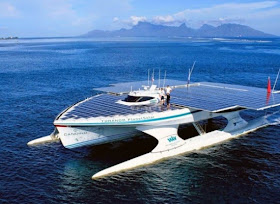 |
| The MS Turanor PlanetSolar, the largest solar catamaran, is to assist archaeologists in their underwater excavations in the Argolic Gulf [Credit: PlanetSolar] |
The underwater excavation is going to take place near the submerged Franchthi cave, where the archaeologists hope to uncover the oldest European settlement dating back to the Palaeolithic and Neolithic eras. Minister of Environment Yannis Maniatis commented that the excavations "are a dive into the History of this land" and argued that the Argolida "is the world’s large open archeological site […] where Homo Sapiens took his first prehistoric steps in the Mediterranean".
According to researchers, the Franchthi cave on the northern shore of Kiladha bay (Argolic Gulf) was occupied for some 35,000 years, from the Palaeolithic to the Neolithic ages. If the scientists' theory is correct and leads to a discovery of ancient civilization undersea, this would lead to the suggestion that Greece played a key role in the rise of the Neolithic way of life as it spread from the Middle East to Europe.
The excavation, which is code-named 'TerraSubmersa', is set to begin on the 1st of August, with the main body of research scheduled to occur between the 18th August and 12th of September. Scientists on board the 'MS Turanor PlanetSolar' will be assisted by the Hellenic Center for Marine Research (ELKETHE) to carry out geophysical surveys in order to accurately document the topography.
The TerraSubmersa mission is supported the University of Geneva, the Swiss Archaeological School in Greece, the Hellenic Department of Underwater Antiquities and ELKETHE.
Interesting. I heard that in some submerged caves on the island of Crete they had found the skeletons of small sized elephants.
ReplyDelete